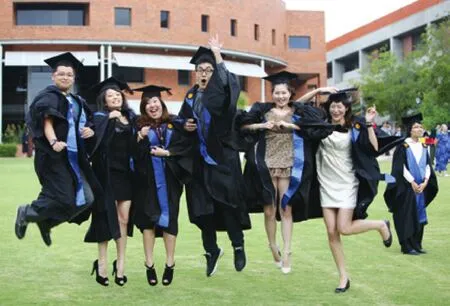Foreign Education,Chinese Dream
2012-10-14ByYuYan
By Yu Yan
Foreign Education,Chinese Dream
By Yu Yan
Chinese young people seek to study abroad and work back in China
O n February 14, 2012, Educational Testing Service (ETS) announced that in 2011 the number of candidates taking the Test of English as a Foreign Language (TOEFL) in China increased nearly 19 percent compared with that of 2010 and that the organization plans to further expand this figure in China in 2012.
“I started to apply for study in the United States in 2002. A t that time, almost all top undergraduate students in our university wanted to study abroad for a graduate degree,” said Zhou Ye, Investment Director of Softbank China Venture Capital (SBCVC),a leading venture capital firm headquartered in Singapore and Hong Kong. Zhou got high marks in both TOEFL and GRE tests.
“Studying abroad can broaden our horizons. And it can give us a fast-track in our careers, in terms of both academics and career development opportunities,” said Zhou.
Zhou was a top student from Tsinghua University in Beijing. A fter graduating from the university w ith a bachelor’s degree in electronic engineering in 2003, he successfully entered the University of California,Berkeley for a Ph.D. degree program in the Electronic Engineering and Computer Science Department w ith a full scholarship. Zhou had some internship experiences and an Internet start-up experience during his Ph.D. years in the United States. A fter getting his Ph.D. from Berkeley in 2008, he came back to work in Shanghai, the city where he was born.
He started as a management consultant in the Shanghai Office of M cKinsey &Company, the world’s leading management consulting firm. And in 2011, he went to SBCVC and became an investment director.
Zhou’s career track is one that many Chinese young people have been seeking. As he sees it, his success largely owes to his educational background and experience abroad.
“The experience in the United States not only enhanced my academic background, but also improved my problem-solving and communication skills,” said Zhou.
The laboratory equipment and research environment in Chinese universities are poor compared to those in developed countries.
It was almost impossible for an electrical engineering postgraduate student in China to get his academ ic paper published in the world’s top academic journals such asScienceandNature.
But once he had the opportunity to do research in top-tier laboratories like those of the University of California, Berkeley, it was much easier, said Zhou.
While studying abroad, he learned how to work in a global team. His colleagues were all young people from all across the w orld and w ith different cultural backgrounds. It was a very precious experience to work, communicate and cooperate w ith them, said Zhou.
The overseas experience also made him realize there were other lifestyles and values in the world.
The problem-solving and communication skills he gained from his overseas experience laid a sound foundation for his later work at M cKinsey, said Zhou, who successfully got a promotion as engagement manager after working in the highly competitive company for two years.

WELCOME ABROAD: A rep resentative o f a U.S. college’s adm ission office introduces his college to Chinese parents at an education exhibition in Nanjing, capital of east China's Jiangsu Province, on February 20

HAPPY GRADUATION:Chinese students celebrate before the commencement ceremony at Curtin University o f Technology in Perth, Australia on February 11
According to a survey conducted by Chinese media in 2010 among Chinese students who planned to study abroad, about 59.6 percent of the respondents said they decided to study abroad because of the better education quality in recent years.
The number of Chinese students who studied abroad surged in the past few decades.
According to the statistics of China’s M inistry of Education, a total of 339,700 Chinese students went abroad for graduate and undergraduate studies in 2011, an increase of 19.32 percent over that of 2010.
Coming home
When asked why he chose to return to China after graduation, Zhou said it was because the career development opportunities in China were better.
“If I stayed in the United States, I would most likely have worked in Silicon Valley as an engineer and the career upside would be limited.In the United States, my Chinese background would not be valued in my career. However, in China, both my Chinese background and international background are very valuable. There were many better career choices for me in China. At last, I chose the Shanghai Office of McKinsey.The job opportunity was great, and the career upside in China is unlimited,” said Zhou.
At the bottom of his heart, he wanted to go back to his hometown so that he could take care of his parents, said him.
Zhou’s choice reveals a trend that more Chinese students are w illing to return to China for work after completing their studies in developed countries.
“If conditions permit, I w ill send my son to study abroad. Better to send him abroad earlier, right after high school when he is 18 years old,” said Zhou.
Like Zhou, many Chinese parents now intend to send their children abroad at an earlier age.
Starting from 2010, more and more Chinese secondary school students aged around 15 went to study in the United States.Some parents even send their children abroad for primary school.
W hile the number of students going abroad is increasing,the percentage of those returning is also increasing. One reason is the sluggish job market in the United States.Due to the im pact o f the international financial crisis which broke out in 2008,the United States has been suffering from an unemployment rate of around 10 percent.Most Chinese students find it difficult to land a satisfactory job in the United States after graduation.
In addition, it is difficult for them to get promoted to senior management positions.Most Chinese imm igrants lived an ordinary life in the United States, said Zhu Hongwen,Chairman of the Chinese Students and Scholars Association in New York.
Retuning to China, they can get a strong sense of social identity that they cannot get in the United States. They are a privileged group of people in career development thanks to their overseas experience and the English language advantage, said Zhu.
The number of Chinese students who return after studying abroad is increasing.According to the latest statistics of China’s M inistry of Education, in 2011, a total of 186,200 Chinese students, or 54.8 percent of the total, returned to work in China, up by 38.08 percent compared with that of 2010.
